“Build in public” or “building in public” may or may not be a phrase you’ve come across, mainly because it’s pretty new. But we’ve been keeping our eyes peeled on the Twittersphere to see how builders and startup founders are using this new trend.
But first, a quick introduction:
What is “build in public”?
Building in public (BIP) is the practice of sharing stories about how products or services were — and are — being developed, with the aim of inspiring and engaging with like-minded people.
Community building. We love to see it.
By publicly sharing steps taken and voicing lessons learned along the way, you can really build a buzz around your new product, and build your network and engagement in a big way. It could even be the tactic that attracts your investors and key hires. 👀
Twitter is just one example of a platform where founders and builders can (and do) share their experiences and learnings. Others have found success through other social media platforms (Instagram, TikTok, and Snapchat) and forums like Reddit and Indiehackers.
The biggest benefits of a "building in public" mindset
There are plenty of reasons to give BIP a go:
- Build your network online, and consequently offline
- Grow relationships with like-minded people
- Attract investors and key hires for your business
- Stay in the forefront of your target audiences’ minds
- Build trust in your community, and sell without actually selling
- Get yourself jobs at impressive tech startups
The secret weapon to this all? Being completely open and transparent.
But we do appreciate it’s not everyone’s cup of tea.
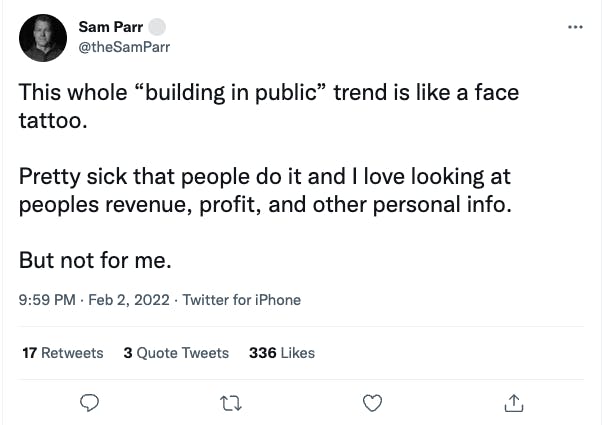
Fair enough, Sam.
10 eye-catching examples of “building in public”:
We’ve rounded up ten of our favorite BIP threads we’ve discovered recently and want to tell you why we think they could work a treat for you too.
And don’t forget to see how they further engage with tweeters once they’ve told their story.
1) The idea-to-launch process thread
What could be more relatable to entrepreneurs than an idea-to-launch process? In the "build in public" format, you can take us through the whole building process step by step, from brainstorming to building.
How about this thread as an example?
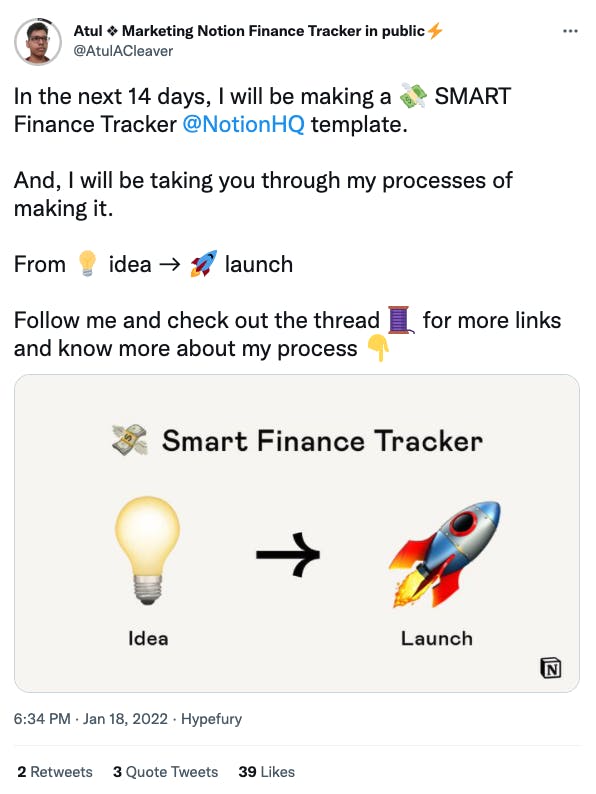
2) The ongoing thread
But hey, you don’t necessarily have to have an endpoint to your thread. Because, after all, growing your business and its audience never ends. And you’re bound to find new truths, tips, and tricks every step of the way.
We love this example, where @JoshLachkovic touches on marketing his product, saving others time by having all ideas for paid ads in one place.
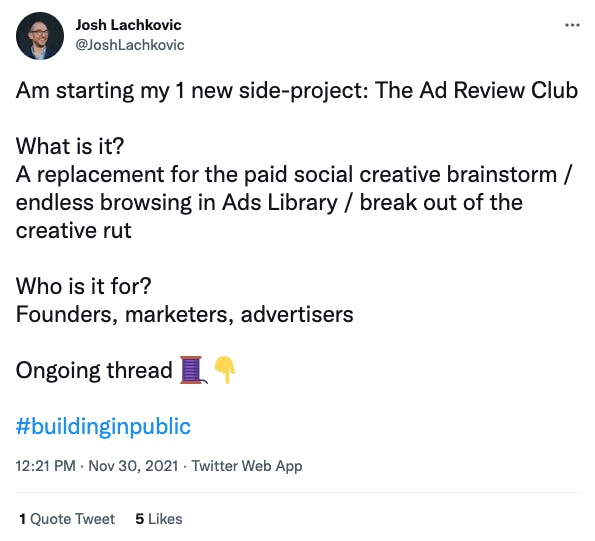
3) The monthly round-up thread
Similar to keeping up an ongoing thread, you could add to it each month with a round-up of your numbers and updates for total transparency of how your progress is going.
Take a look at this one, where @kavyaj93 includes numbers, graphs, and feedback from users in January 2022. We’ll be back to see what February brought for Resumey.Pro, won’t we?
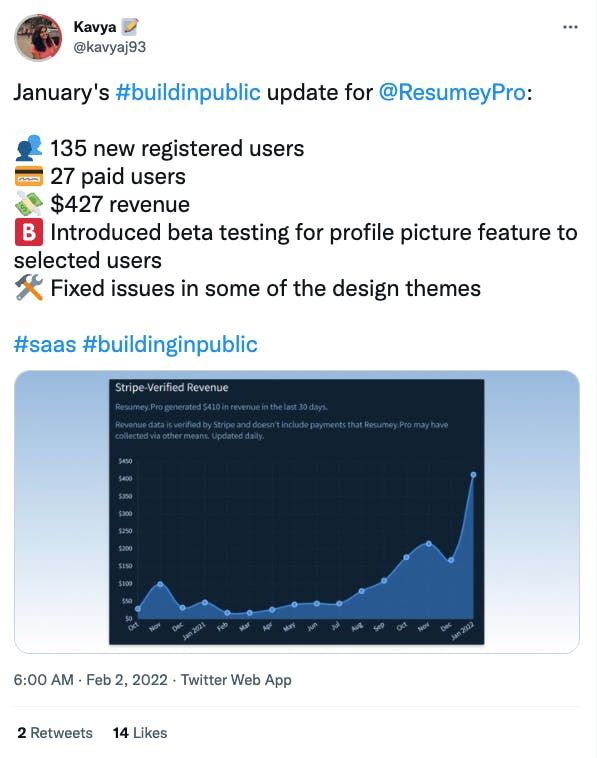
4) The ‘here’s how’ thread
A community of entrepreneurs and developers sharing their newfound knowledge and quick hacks after a much longer discovery process for themselves? Selfless — and incredibly useful to many. And what’s good about being useful? People will trust you, and they will follow you.
How about this example from @theryanking, the founder of Bolt? Big on Twitter threads that help and inspire a lot of people. This specific one offers eight points of advice on a newer approach to growth strategies: founder-led growth.

5) The accountability thread
What’s more open and transparent than revealing your own to-do list to the eyes of the internet? Setting yourself daily targets that are too easy? Someone is going to let you know. Fail to deliver on what you promised yourself and your business? Cat’s already out of the bag.
This real-time thread is all about accountability, and it’s being updated on a daily basis for some real insight into the life of @BootstrapBro. (He’s actually doing very well with that promise).
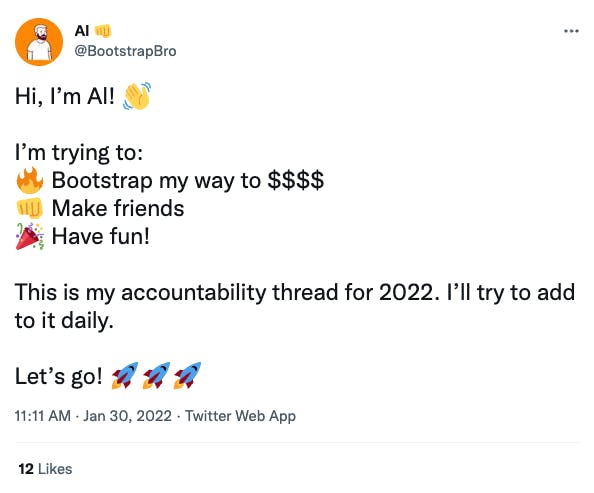
6) The "from me to you" thread
We love to hear business owners share their entrepreneurship successes, but finding out how they believe they became successful? Even better. This kind of knowledge is absolute gold, and you should see platforms like Twitter as a real treasure chest for your business growth.
Entrepreneur-investor Elizabeth Yin (or @dunkhippo) is what we’d consider an open book, talking of her flaws and learnings along the way. Check this one out:
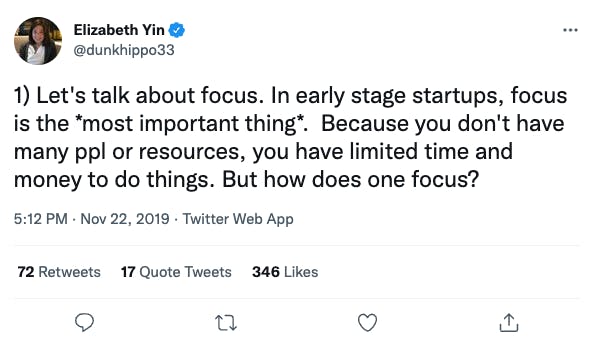
7) The can’t-help-but-click-through thread
Clickbait. Sometimes frowned upon, but in the world of building in public, if it’s genuinely useful and inspirational content: you’ve got our support, for sure. Whether it’s a big name drop, big numbers, or a little comment to spark your curiosity, you can grab people’s attention.

8) The AMA thread
Talking about open books, you can really feed yourself to the sharks with an Ask Me Anything-type tweet. Or you can, in fact, inspire and engage a lot of like-minded people in your space in a way they keep coming back for more. (We like the latter).
Try this one for size, with super useful replies of advice and links to really benefit his audience:
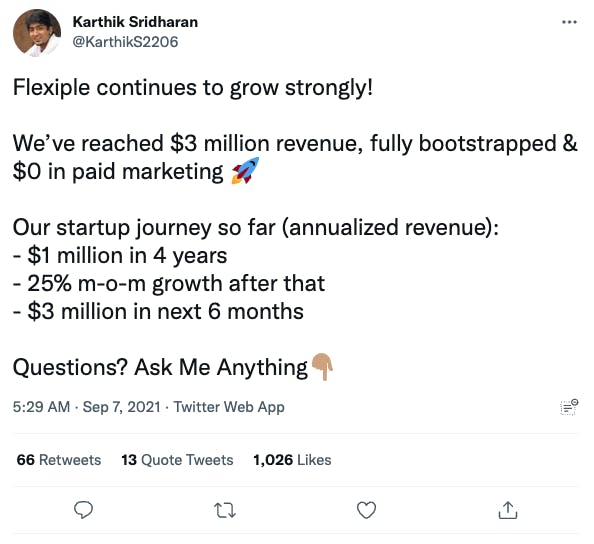
9) The Entrepreneur Diaries thread
Getting businesses from the idea to the creation stage is no easy battle. In fact, if we had a dollar for how many ideas don’t make it beyond that stage, we’d all be laughing at Jeff Bezos. Most entrepreneurs know that better than the rest.
That’s why we love this honest BIP thread, where @nathanbarry goes through the products he’s launched prior to his very successful venture ConvertKit. Oh, and their revenue too (or lack of).
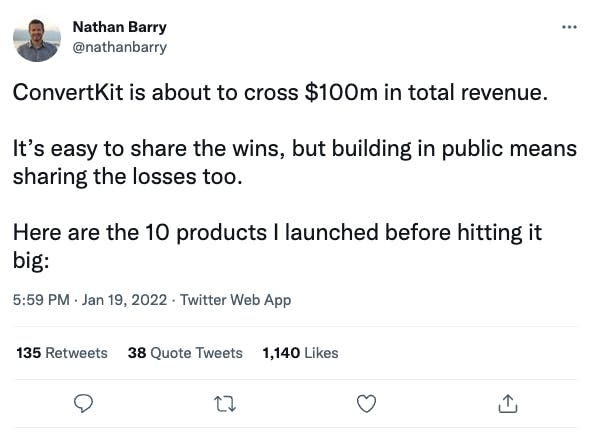
10) The "lists of threads" thread
We’re all about singing your own praises when it comes to hard work and success, and you know what? There’s nothing to say you can’t do this when you’ve mastered the world of really, really helpful Twitter threads to help other founders and devs.
Lots of useful information, all in one place. What’s not to love? Take a deep dive into the world of @AngeZanetti threads — it’s definitely one to save in your Likes.
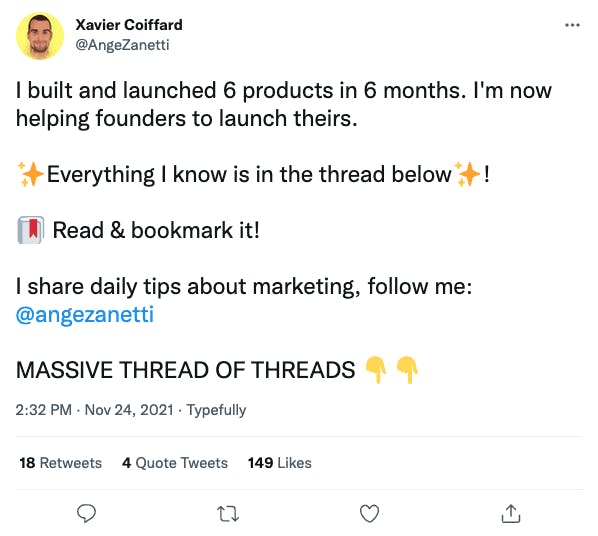
Build in public FAQs
Does "Build in Public" work?
Building in public (BIP) is an effective strategy that helps create space to share information about the business and new products, grow public support, and find early adopters.
What are open startups?
An open startup refers to a company or product that can be said to value the “build in public“ approach. These businesses openly share their metrics and are transparent about how they earn their money.
How do you make a product public?
Some of the best ways to approach the “building in public“ strategy include:
- Sharing screenshots and quotes of customer feedback, Tweets, internal Slack threads, and other customer communication channels
- Publishing real company stories and sharing roadblocks and tactics that helped you reach milestones
- Offering insight into the product roadmap and how your company operates
- Leveraging platforms like ProductHunt to give a preview of new product features and updates




